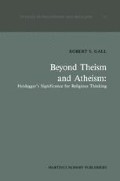Abstract
How do things stand with religious thinking today? To some, confident of the genius of modern science and technology, the question is strange. In this day and age, what need have we of religious thinking and its talk of God, of faith and belief, myth, rite, ritual, and church? The self-correcting rationality of modern scientific thought seems more than sufficient for our needs. In the natural sciences it has produced an impressive, objective, ever-expanding picture of our universe that reaches from the peculiarities of sub-atomic particles to those of massive stars and galaxies hundreds of light years away. In the medical, social, and human sciences it has probed our tissues, our psyches and our social relationships and given us often remarkably successful answers for curing what ails us. What is more, it has produced technologies that provide us with vast powers of information, communication, and physical strength that allow man to literally change the world. What need have we of gods and superstition if we can be as gods ourselves, or create our own gods (e.g., the computer), and thereby become content amidst the brilliant logical dazzle of science and technology?
Had they deceived us Or deceived themselves, the quiet voiced elders, Bequeathing us merely a receipt for deceit? The serenity only a deliberate hebetude, The wisdom only the knowledge of dead secrets Useless in the darkness into which they peered Or from which they turned their eyes. T.S. Eliot
Access this chapter
Tax calculation will be finalised at checkout
Purchases are for personal use only
Preview
Unable to display preview. Download preview PDF.
Notes
“Four Quartets” in The Complete Poems and Plays: 1909–1950 (New York: Harcourt, Brace and World, 1971), p. 125.
See Thomas Kuhn, The Structure of Scientific Revolutions, 2nd, enlarged ed. (Chicago: University of Chicago Press, 1970);
Paul Feyerabend, Against Method (1975; rpt. London: Verso, 1978).
E.g., a recent article by the theologian Gordon D. Kaufmann entitled “Theology as Imaginative Construction,” The Journal of the American Academy of Religion 50 (1982), pp. 73ff, is typical of the emphasis placed on symbols and “imperfect” representations of the divine in theology.
E.g., see John Caputo, Heidegger and Aquinas: An Essay on Overcoming Metaphysics (Bronx, N.Y.: Fordham University Press, 1982), pp. 15–61,
and Thomas Sheehan, “Heidegger’s ‘Introduction to the Phenomenology of Religion’ 1920–21,” The Personalist 60 (1979), pp. 312–324.
E.g., Marjorie Grene, certainly no devotee of Heidegger, saying that “for this reason if no other it is fair to say that any contemporary philosophy ought to proceed from the foundation established once and for all in Being and Time.” Philosophy In and Out of Europe (Berkeley: University of California Press, 1976), p. 29.
See William Barrett, The Illusion of Technique (Garden City, N.Y.: Anchor Press/Doubleday, 1979), p. 251;
H.J. Blackham, Six Existentialist Thinkers (New York: Harper Torchbooks, 1959), p. 103;
Annemarie Gethmann-Siefert, Das Verhältnis von Philosophie und Theologie im Denken Martin Heideggers (Freiburg/München: Karl Alber, 1974), pp. 96–98
Karl Löwith, Heidegger: Denker in dürftiger Zeit, 2nd, expanded ed. (Gottingen: Vandenhoeck and Ruprecht, 1960), pp. 10, 72, 111. Of course, those with definite conceptions of what religion is (e.g., theologians) are less inclined to so characterize Heidegger’s thinking;
See John Caputo, “The Poverty of Thought: A Reflection on Heidegger and Eckhart” in Heidegger: The Man and the Thinker, ed. Thomas Sheehan (Chicago: Precedent, 1981), p. 125;
Heinrich Ott, “Die Bedeutung von Martin Heideggers Denken für die Methode der Theologie” in Durchblicke: Martin Heidegger zum 80. Geburtstage (Frankfurt: Klostermann, 1970), p. 27;
John R. Williams, Martin Heidegger’s Philosophy of Religion (Waterloo, Ontario: Wilfrid Laurier University Press, 1977), p. 4.
Cf. J.L. Mehta, Martin Heidegger: The Way and the Vision (Honolulu: University Press of Hawaii, 1976), pp. 5–6, 79n, 467;
Zygmunt Adamczewski, “On the Way to Being: Reflecting on Conversations with Martin Heidegger” in Heidegger and the Path of Thinking, ed. John Sallis (Pittsburgh: Duquesne University Press, 1970), pp. 21–22.
David Farrell Krell has been the most forceful in arguing against the preoccupation with the Kehre and the division of Heidegger’s thinking into various phases; see “Nietzsche and the Task of Thinking: Heidegger’s Reading of Nietzsche” (Diss. Duquesne University, 1971), pp. 261, 262n;
David Farrell Krell “Nietzsche in Heidegger’s Kehre,” Southern Journal of Philosophy 13 (1975), pp. 197–204;
David Farrell Krell “Death and Interpretation” in Heidegger’s Existential Analytic, ed. Frederick Elliston (The Hague: Mouton, 1978), pp. 247–255.
See also William J. Richardson, Heidegger: Through Phenomenology to Thought (The Hague: Martinus Nijhoff, 1963), pp. 625–26, where Richardson cites parallel themes between “Heidegger I” and “Heidegger II” such that he says the latter is a “re-trieve”, a self-interpretation, of the former. Our only problem with Richardson is his insistence on continuing the division (e.g., pp. 243ff) and then trying to piece the two together.
For Heidegger’s comments on the Kehre, see his Preface to Richardson’s book, pp. xviii, xx, xxii, and David Farrell Krell, “Work Sessions With Heidegger,” Philosophy Today 26 (1982), pp. 133–34.
See Michael Zimmerman, The Eclipse of the Self (Athens: Ohio University Press, 1981) for an example of the tendency toward a psycho logistic and biographical interpretation of Heidegger’s thinking that results from dividing it up into sections.
Author information
Authors and Affiliations
Rights and permissions
Copyright information
© 1987 Martinus Nijhoff Publishers, Dordrecht
About this chapter
Cite this chapter
Gall, R.S. (1987). Introduction. In: Beyond Theism and Atheism: Heidegger’s Significance for Religious Thinking. Studies in Philosophy and Religion, vol 11. Springer, Dordrecht. https://doi.org/10.1007/978-94-009-3683-6_1
Download citation
DOI: https://doi.org/10.1007/978-94-009-3683-6_1
Publisher Name: Springer, Dordrecht
Print ISBN: 978-94-010-8149-8
Online ISBN: 978-94-009-3683-6
eBook Packages: Springer Book Archive

